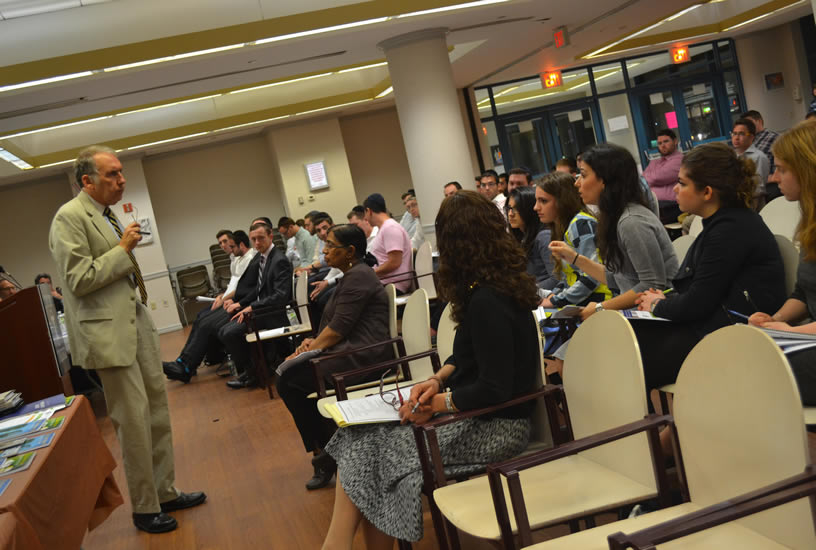LAS Students Learn About Touro's Medical, Dental and Pharmacy Schools
"The Interview is Key"
Looking for a Shomer Shabbat residency? Look no farther than New York Medical College (NYMC), part of the Touro College and University system.
That was one of the facts that students at Lander College of Arts and Sciences (LAS) learned during a wide-ranging discussion for pre-dental and pre-med students presented at the campus last month. More than 50 LAS students listened intently to NYMC's Chancellor and CEO Dr. Edward Halperin; Touro College of Dental Medicine Senior Associate Dean Dr. Edward Farkas; and Touro College of Pharmacy (TCOP) Dean Dr. Henry Cohen.
"The fact that we're holding this event is a reflection of our commitment to your future," stated LAS Dean and Touro College Vice President Dr. Robert Goldschmidt. Also in attendance were several professors and chairs at LAS including: Dean Dr. Henry Abramson; Dr. Robert Bressler, Dr. Evan Minzer; and Dr. Najmunisa Abassi.
Touro Executive Vice President Rabbi Moshe Krupka moderated the panel and spoke about Touro’s commitment to its students.
"At Touro, you will never have to choose between your religious convictions and your career goals," explained Rabbi Krupka.
Rabbi Krupka also enumerated the other perks that NYMC offers to religious students: an eruv, daily minyanim, shiurim, Daf Yomi and an OU-supervised kosher kitchen. NYMC also leads the nation in offering Shomer Shabbat residencies through their affiliate hospitals across New York.
"Touro has nearly 18,000 students," Rabbi Krupka said. "And every one of them is incredibly important to us."
Dr. Halperin spoke about some things students should consider before applying to medical school, including the school’s mission, curriculum and clinical material. Medical schools vary in what they focus on, he elaborated. Some medical schools have a strong focus on research, while others focus more on producing primary care physicians.
"One mission isn’t better than another," said Halperin. "They’re just different and you have to decide what fits with your personal goals and objectives."
He advised students to know what type of education they wanted before entering medical school. Dr. Halperin also delivered practical tips for the medical school interview—or any interview—including showing up on time, maintaining eye contact and dressing conservatively. Halperin also advised students to send thank-you cards to their interviewer afterwards.
"It’s an interview the moment you step on campus until the moment you get into your car to leave,” Dr. Halperin said.
TCOP Dean Henry Cohen also stressed the importance of the interview in the pharmacy school admissions process.
"The key is the interview," Dr. Cohen said during his powerpoint presentation about the broad possibilities of a career in pharmacy. The pharmacy industry has changed, explained Dr. Cohen, and while most people are familiar with a pharmacist’s role in a chain pharmacy, there are additional professional options including drug development, ambulatory care and hospital-based positions.
"Two-thirds of pharmacy students go into practice after graduating," said Dr. Cohen. "One-third go into residencies."
Dr. Cohen also described the extra rotations that TCOP offers its students. When asked about how important volunteer work is for a pharmacy application, Dr. Cohen explained that the most critical factor is being articulate about it.
"Do something you’re interested in," said Cohen. "And you’ll be able to talk about it."
With Dr. Farkas delayed due to a late flight, Dr. Halperin also delivered remarks for the dental school. At a dental school interview, don’t be surprised if the interviewer asks if you play an instrument or knit.
"They’re looking to see if you have hand-eye coordination," explained Dr. Halperin. "You don’t go to dental school unless you like working with your hands."
When Touro College of Dental Medicine opened last year, it became the 66th dental school in America. Aside from the same perks being offered to religious students at NYMC, Dr. Halperin mentioned the school’s amenities, which include a renovated state-of-the-art multimillion dollar building and that each student has his or her own individual head and neck dental stimulator, a robotic manikin that respond to dental treatment.
Halperin also described the differences between medical school curriculum and dental school curriculum. In most states dental students can practice as soon as they finish school and pass licensure examinations, unlike medical doctors who spend several years in residencies.
"You will learn procedures beginning in your first few weeks of dental training," he said.
A lengthy question and answer session followed the program and students met with all three men privately.
Ari Lehmann, a senior at LAS with a double major in biology and psychology, said the event was "wonderful."
"It tells us what to expect when we apply to medical school. We’re being informed by people who know the system," Lehmann explained.
"It was an opportunity to get all the information," said LAS student Bracha Sachs. Her main takeaway was how important the interview was. "Your behavior on the interview and how much it matters. It’s a big factor in the decision to accept you."
A second similar program for students interested in other areas of medicine and health sciences will take place in November at LAS.


